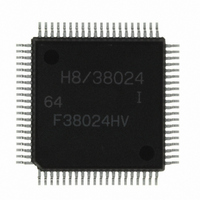HD64F38024DV Renesas Electronics America, HD64F38024DV Datasheet - Page 407

HD64F38024DV
Manufacturer Part Number
HD64F38024DV
Description
IC H8/SLP MCU FLASH 80QFP
Manufacturer
Renesas Electronics America
Series
H8® H8/300L SLPr
Datasheets
1.US38024-BAG1.pdf
(684 pages)
2.DF36012GFYV.pdf
(1021 pages)
3.DF38102HV.pdf
(145 pages)
Specifications of HD64F38024DV
Core Processor
H8/300L
Core Size
8-Bit
Speed
10MHz
Connectivity
SCI
Peripherals
LCD, PWM, WDT
Number Of I /o
51
Program Memory Size
32KB (32K x 8)
Program Memory Type
FLASH
Ram Size
1K x 8
Voltage - Supply (vcc/vdd)
1.8 V ~ 5.5 V
Data Converters
A/D 8x10b
Oscillator Type
Internal
Operating Temperature
-40°C ~ 85°C
Package / Case
80-QFP
Lead Free Status / RoHS Status
Lead free / RoHS Compliant
Eeprom Size
-
Available stocks
Company
Part Number
Manufacturer
Quantity
Price
Company:
Part Number:
HD64F38024DV
Manufacturer:
Renesas Electronics America
Quantity:
10 000
- Current page: 407 of 1021
- Download datasheet (5Mb)
(b) FILE structure and file pointer
(c) Functions and macros
(d) EOF
The buffer, and other information, required for the stream input/output described above are
stored in a single structure, defined by the name FILE in the <stdio.h> standard include
file.
In stream input/output, all files are handled as having a FILE structure data structure. Files
of this kind are called stream files. A pointer to this file structure is called a file pointer,
and is used to specify an input/output file.
The file pointer is defined as
When a file is opened by the fopen function, etc., the file pointer is returned. If the open
processing fails, NULL is returned. Note that if a NULL pointer is specified in another
stream input/output function, that function will end abnormally. When a file is opened, the
file pointer value must be checked to see whether the open processing has been successful.
There are two library function implementation methods: functions and macros.
A function has the same interface as an ordinary user-written function, and is incorporated
during linkage. A macro is defined using a #define statement in the standard include file
relating to the function.
The following points must be noted concerning macros:
(i) Macros are expanded automatically by the preprocessor, and therefore a macro cannot
(ii) If an expression with a side effect is specified as a macro parameter (assignment
In functions such as getc, getchar, and fgetc, which input data from a file, EOF is the
value returned at end-of-file. The name EOF is defined in the <stdio.h> standard include
file.
be invalidated even if the user declares a function with the same name.
expression, increment, decrement), the result is not guaranteed.
Example: Macro definition of MACRO that calculates the absolute value of a
If the following definition is made:
#define
and if
X=MACRO(a++)
is in the program, the macro will be expanded as follows:
X = ((a++) >= 0 ? (a++) : -(a++))
a will be incremented twice, and the resultant value will be different from the absolute
value of the initial value of a.
parameter, is as follows
MACRO(a)
FILE *fp;
((a) >= 0 ? (a) : -(a))
393
Related parts for HD64F38024DV
Image
Part Number
Description
Manufacturer
Datasheet
Request
R

Part Number:
Description:
KIT STARTER FOR M16C/29
Manufacturer:
Renesas Electronics America
Datasheet:

Part Number:
Description:
KIT STARTER FOR R8C/2D
Manufacturer:
Renesas Electronics America
Datasheet:

Part Number:
Description:
R0K33062P STARTER KIT
Manufacturer:
Renesas Electronics America
Datasheet:

Part Number:
Description:
KIT STARTER FOR R8C/23 E8A
Manufacturer:
Renesas Electronics America
Datasheet:

Part Number:
Description:
KIT STARTER FOR R8C/25
Manufacturer:
Renesas Electronics America
Datasheet:

Part Number:
Description:
KIT STARTER H8S2456 SHARPE DSPLY
Manufacturer:
Renesas Electronics America
Datasheet:

Part Number:
Description:
KIT STARTER FOR R8C38C
Manufacturer:
Renesas Electronics America
Datasheet:

Part Number:
Description:
KIT STARTER FOR R8C35C
Manufacturer:
Renesas Electronics America
Datasheet:

Part Number:
Description:
KIT STARTER FOR R8CL3AC+LCD APPS
Manufacturer:
Renesas Electronics America
Datasheet:

Part Number:
Description:
KIT STARTER FOR RX610
Manufacturer:
Renesas Electronics America
Datasheet:

Part Number:
Description:
KIT STARTER FOR R32C/118
Manufacturer:
Renesas Electronics America
Datasheet:

Part Number:
Description:
KIT DEV RSK-R8C/26-29
Manufacturer:
Renesas Electronics America
Datasheet:

Part Number:
Description:
KIT STARTER FOR SH7124
Manufacturer:
Renesas Electronics America
Datasheet:

Part Number:
Description:
KIT STARTER FOR H8SX/1622
Manufacturer:
Renesas Electronics America
Datasheet:












